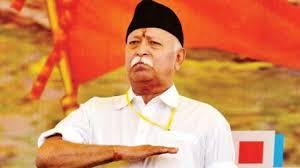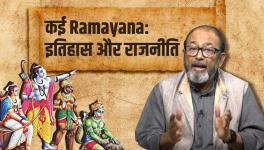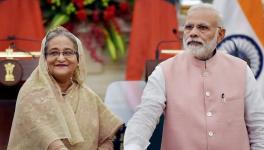Fixing Popular Myths About Bhagwat’s 'Lynching' Speech

The summary by the Doordarshan announcer at the end of Rashtriya Swayamsevak Sangh (RSS) chief Mohan Bhagwat’s 2019 Vijaydashami speech was actually a comment. Speaking in sarkari format, the announcer reprised the speech as ranging from the economy to “mob lynching.” The announcer’s reference to lynching—probably an unthinking one—showed that Bhagwat’s condemnation of the word lynching had not cut ice.
Even pro-government media commentators were critical of Bhagwat’s reported claim that lynching was a foreign concept. Possibly, memories of the authoritarian period of former prime minister Indira Gandhi’s government—which constantly raised the specter of a “foreign hand” while squeezing out dissent and protest—had something to do with the skepticism with which his claim was received.
But we are doing Bhagwat a disservice by reducing his idea of the foreign to the external physical power of the “hand”. Lynching is, for him, foreign on both physical and cultural grounds. He denies that such actions had ever occurred in India, which is why we did not have a conceptual vocabulary for lynching. This is doubtful. Even in the normative texts of classical India, which the RSS equates with the reality of ancient life, there is mention of Brahmins who ganged up to slay Vena, the unrighteous king. Such acts may not have been given a Sanskrit term that is an equivalent for lynching, but it does have all the features of a lynch. In modern times, besides informal punishments inflicted on non-elite sections, as enacted in places such as Khairlanji, lynching has been very common in riot situations. These have been with us since at least the 20th century. But it may be that Bhagwat did not mean this either.
There is something new: Since 2014, serialised beatings and murders of individuals in everyday life, coupled with the moral claim of protecting the sacred sentiments of Hindus, is an addition to our traditions of violence. This raises an important issue about Bhagwat’s speech. Contrary to his assumption that traditions are easily divided between what is foreign and what is native, traditions are elastic. They constantly take in new elements from outside and remake themselves.
The fact that the original RSS uniform itself derived from the Boy Scouts comes home very clearly on the very stage from which the Vijayadashami speech was delivered. The only person in a recognisable “Indian” outfit on that stage was Shiv Nadar, a non-RSS citizen. The speech itself is peppered with English equivalents. Bhagwat even declares that that he is not averse to calling “Bharat”, “Indic”, for example. So, if the Boy Scouts can be internalised and the name of Bharat can be used in different ways as representing “Bharatiya sanskriti”, why then is “lynching” to be banished from the lexicon of the land?
What the new RSS has grasped is the power of mass representation; of convincing people about perceptions and branding. This has always been important for Hindutva. They are obsessed with the self-image of Hindus and the need to teach a great many inhabitants of the country to perceive themselves as “Bharatiya” in the way the RSS prescribes for them. As the BJP, its political offspring, has become the dominant political force in the country, the RSS has correspondingly announced a shift in its goalpost. Now it seeks to make the entirety of Indian society identical with it. An important step to achieve this is to change its self-representation. Hence, Bhagwat publicly represents the RSS as tolerant and open to all—so long as they do not challenge each other or raise embarrassing issues that lead to conflicts among Hindus.
While the RSS fancies itself as having achieved near cultural hegemony in the country, the problem of controlling representations of India abroad—especially in a globally interconnected world—becomes critical. The real issue is: what foreign elements can be accepted and what are not permissible. In other words, foreignness is an instrument of thought-policing.
Significantly, following his disquisition on lynching, Bhagwat talks of the problem of economic slowdown. However, he does not approve of the constant public discussion on the slowdown. Indeed, in a parallel move to his objection to lynching, he denies there is a slowdown at all, since the economy officially still climbs at 5% and has not gone into the red. Even discussion on the economy, for him, is impermissible, since it allegedly misrepresents the actual economic power of India. Talking about the slowdown could deter investors and may actually result in economic decline. Hence, public discussion on it has to be curbed to represent India correctly to the world outside.
Mass media representation is a postmodern global power and the RSS knows it has to control it. Accordingly, India has to be represented as tolerant and open-minded, a moral exemplar for the world—especially to the affluent and influential Non-Resident Indians (NRIs). Hence, the use of the word “lynching” becomes impermissibly “foreign”, for it goes against the representation of India as a harmonious, conflict-free society.
Even more important for the RSS is to control the agents—the “Not-in-My-Name” movement and the growing swathe of dissenters—who are disseminating a “foreign” image of India. RSS is trying not to commit the mistake that Indira Gandhi committed, that is, impose authoritarian controls without producing a moral justification for it. By stigmatising protests against lynching, the RSS seeks to criminalise that protest. It is possibly building up a moral consensus for the next step, that is, punishing offensive protesters.
Petitions to the governing authority were tolerated during the colonial period of India’s history and were regarded by 20th-century nationalists as a moderate measure. Now, in independent India, even the simple act of pleading with the Prime Minister to stop unchecked violent mob action against ordinary citizens is generating sedition charges and summary dismissals of students. The straws in the wind are rapidly changing into lathis of dharmic censure.
Bhagwat’s version of lynching testifies to the political power of representation. Contrary to media reports that he has attributed lynching to Christianity, he has only said that references to lynching are to be found in the Bible. Bhagwat goes on to say that Christ prevents the lynching of a woman through persuasion. The implication is that this is a pre-Christian tradition, belonging to an unspecified culture of West Asia (which all of us can infer!) that stones women.
Bhagwat’s version of the etymology of “lynching” thus replaces the actual origin of the term. “Lynching” is actually an eponym—a word named after a person. The person (or persons, actually, for there are two claimants to “lynch”) who originated this extra-legal form of punishment happen to be White Americans, William and Charles Lynch. By the late 1890s, lynching acquired its present meaning, that is, brutal murders of blacks by White supremacists.
This history and tradition of racism is removed in Bhagwat’s version of where the word came from. Is this history being disappeared in order to be filled in by a vague unspecified culture of the Middle East? Is this the Arabic culture so heavily castigated by the ‘Indic’ author Rajiv Malhotra in his video conversation with Bhagwat? Or is it because at a time when a section of NRIs and United States President Donald Trump’s racially-oriented policies are harmonising, conservative White America must not be offended by reminders of their genealogy?
Pradip Kumar Datta teaches history at Jawaharlal Nehru University, Delhi. Views are personal.
Get the latest reports & analysis with people's perspective on Protests, movements & deep analytical videos, discussions of the current affairs in your Telegram app. Subscribe to NewsClick's Telegram channel & get Real-Time updates on stories, as they get published on our website.
























